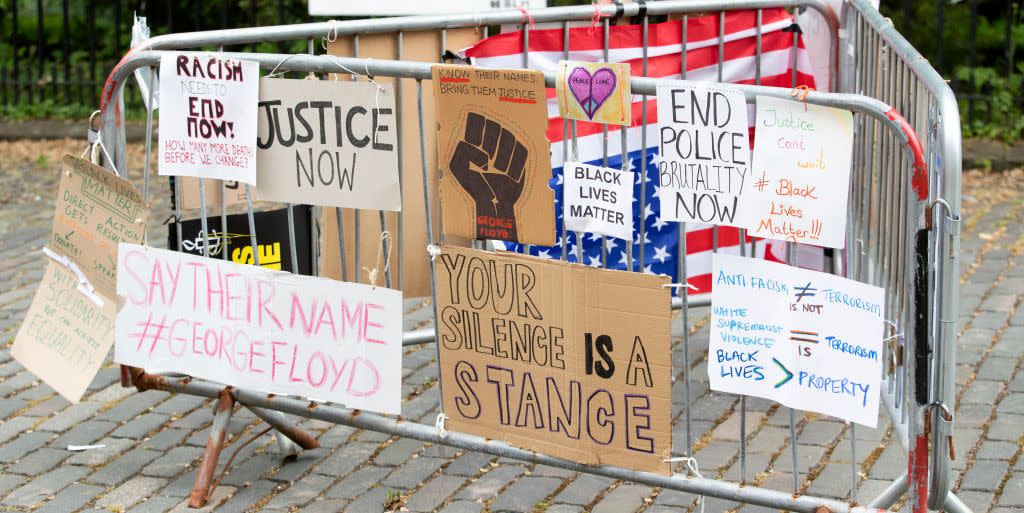Everything You Need to Know About Blackout Tuesday

On Tuesday, June 2, 2020, accounts all over the world will be initiating a blackout as part of Blackout Tuesday in support of the Black Lives Matter movement and to help continue to raise awareness in response to the murders of George Floyd, Breonna Taylor, Ahmaud Arbery and many others who have lost their lives due to police brutality and racism in America. While it may seem like the idea of Blackout Tuesday came out of nowhere, or if you're wondering what you should do during the day, here's everything you need to know about Blackout Tuesday.
How did it get started?
On June 1, Atlantic Records exec Jamila Thomas and Platoon's Brianna Agyemang came together to form #TheShowMustBePaused, a movement aimed at the music industry to take a pause to allow people to take the time to reflect and think about the changes they would like to make in the future.
"Tuesday, June 2nd is meant to intentionally disrupt the work week...It is a day to take a beat for an honest, reflective and productive conversation about what actions we need to collectively take to support the Black community," they wrote in their original statement.
"The music industry is a multi-billion dollar industry. An industry that has profited predominantly from Black art. Our mission is to hold the industry at large, including major corporations + and their partners who benefit from the efforts, struggles and successes of Black people accountable. To that end, it is the obligation of these entities to protect and empower the Black communities that have made them disproportionately wealthy in ways that are measurable and transparent."
#TheShowMustBePaused pic.twitter.com/JHTUG34Ibj
— theshowmustbepaused (@pausetheshow) June 1, 2020
What should I do for #BlackOutTuesday?
Many people, including those not involved in the music industry, are posting a black square with the hashtag to show that they're in solidarity with those participating. The idea is to fill Facebook, Twitter and Instagram with black squares, freeing up the time usually dedicated to social media for people to educate themselves on the Black Lives Matter movement and give Black people the time to rest and recharge after these past couple of days. However, just posting a black square on your social media isn't the only thing you should be doing.
As, Jamila and Brianna noted on their original post, "In the meantime, to our Black friends and family: please take the time for you and your mental health. To our allies, the time is now to have difficult conversations with family, friends, and colleagues."
What are some things I should keep in mind for #BlackOutTuesday?
Before you post your black square on social media as part of the blackout, make sure that you don't use any of the #BlackLivesMatter or #BLM or any other hashtags used by groups to share information. Instead, use specific hashtags like #BlackOutTuesday or #TheShowMustBePaused in order to allow those who are still using the other hashtags for activism and sharing information to stay on top.
If you're Black, take the day off to rest off and heal. While not everyone may be able to have a day off from work, try to make sure to put yourself first as much as you can.
If you're an ally, take the time to educate yourself. Read articles, personal experiences, and take the time to learn new things about Black Lives Matter and what it means to be an ally. It's not up to Black and other marginalized people to constantly educate others. It's also important for you to seek information as well. Take the time to figure out what kind of ally you want to be. Not everyone can be out there protesting, but there are other ways you can help through donations, petitions, calling local officials, and using your platform for good. Find out ways you can help out in the long-term, not just right in this moment when things are heightened.
Don't forget to take the time to amplify Black voices. Part of the initiative is to make sure that Black voices are the ones being heard. Repost their messages on your own social media so it can reach a new audience.
Jamila and Brianna also asked for allies to have those "difficult conversations with with family, friends, and colleagues." Part of being an ally is also helping to educate others. Talk to the people who clearly are ignoring everything that is happening and remind them why it's important to be there for this movement right now. Call out people who aren't participating (if you feel safe to do so). Check in on your Black friends and make sure they're doing okay.
If we all take the time to educate ourselves and remind each other the importance of learning and reflection, then the Black Lives Matter movement will be stronger than it ever has been before.
You Might Also Like


